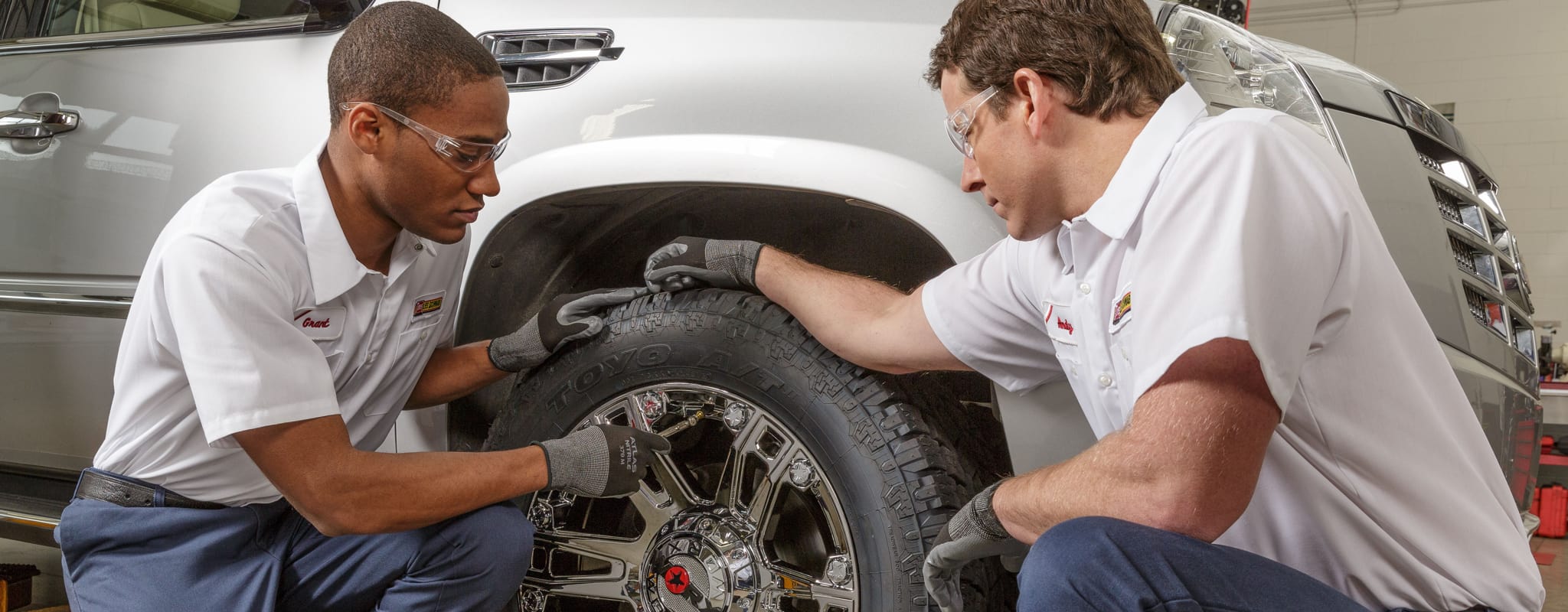Tire Service: The Effect of Climate Condition
When it concerns making certain optimum performance and security when traveling, recognizing the impact of climate condition on tire solution is essential. From scorching heat to icy roadways, each weather condition aspect can considerably influence tire functionality and general driving experience. By diving right into the effects of differing climate condition on tires, motorists can acquire valuable understandings that may enhance their automobile's performance and long life. In this discussion, we will certainly check out the intricate connection between weather and tire service, clarifying the value of weather-specific tire upkeep methods and considerations.
Warm and Tire Efficiency
When revealed to heats, tires experience modifications in performance that can significantly impact automobile safety and security and handling. The heat created from prolonged driving or hot weather condition problems triggers the tire rubber to soften, leading to lowered walk life and increased wear. As the rubber comes to be softer, the tire's grasp when traveling lessens, impacting stopping ranges and overall traction. In severe instances, excessive heat can even trigger tire blowouts, posturing a severe security threat to the lorry and its passengers.

Cold Climate Impacts
Winter conditions can have a considerable impact on tire performance and safety. As temperature levels drop, tire rubber can solidify, resulting in decreased traction on icy or snow-covered roadways. In winter, tires might also lose air pressure much more swiftly, which can impact taking care of and fuel effectiveness. Additionally, cool temperatures can trigger tire sidewalls to stiffen, boosting the danger of damages from craters or other road risks.
To mitigate the results of winter on tires, it is vital to frequently examine tire pressure and inflate them to the producer's suggested degrees. Making use of winter months or all-season tires developed for winter conditions can also enhance traction and hold on icy or snowy roads. Proper tire maintenance, consisting of routine inspections for wear and damages, comes to be a lot more important throughout chillier months to make sure optimal performance and safety.
Rainy Issues Effect
Tires with damaged treads are much more prone to hydroplaning, where a layer of water builds up in between the roadway and the tire surface area, leading to loss of traction. To battle this, chauffeurs ought to consistently check their tires for ample tread deepness and consider spending in tires especially created for wet conditions.
In addition, wet climate can also reduce visibility, making it challenging for motorists to see the roadway ahead clearly (GMC Tire Service). In such problems, it is important to adjust driving rates appropriately and maintain a safe adhering to range to permit for unexpected quits. Correctly filled with air tires can also assist in keeping control on wet roadways by giving better handling and hold
Snow and Tire Safety And Security
When driving in snowy conditions, having the ideal tires can make a considerable difference in security and efficiency. Winter months tires are made with special rubber substances and Click Here walk patterns to provide far better traction on snow and ice contrasted to all-season tires.

Additionally, motorists must think about setting up tire chains in severe snowy conditions. Tire chains supply additional traction by grasping the snow and ice, enhancing security and control. It is vital to comply with manufacturer guidelines when using and installing tire chains to prevent damage to the tires and lorry (GMC Tire Service). By picking the appropriate tires, maintaining proper inflation, and thinking about extra traction aids like tire chains, motorists can improve their security when navigating snow-covered roads.
Weather-Related Tire Upkeep
Weather-related tire upkeep includes a range of techniques intended at guaranteeing optimal tire feature and longevity in various weather scenarios. One vital facet of weather-related tire maintenance is tire pressure policy. Evaluating tire walk regularly and changing tires when walk wear gets to a particular depth is vital for keeping traction and security in unfavorable climate.
Conclusion
To conclude, weather condition conditions have a considerable influence on tire performance and safety. From heat impacting tire pressure and use to cool weather condition reducing grip, it is vital to take into consideration the weather when maintaining and making use of tires. Stormy conditions can reduce hold and bring about hydroplaning, while snow can boost the additional resources danger of mishaps if tires are not properly outfitted. Weather-related tire upkeep is critical in guaranteeing optimum efficiency and safety and security when traveling.
In this discussion, we will certainly check out the elaborate relationship between weather condition problems and tire service, losing light on the importance of weather-specific tire maintenance practices and factors to consider.
